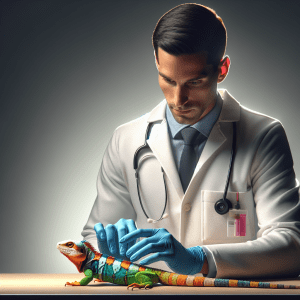Introduction: Importance of Emergency Care for Sick Lizards
Emergency care for sick lizards is a topic close to my heart. Imagine this: you come home one day, excited to check on your scaly friend, only to find them looking lethargic and unwell. It’s a scenario that can send any lizard parent into a panic mode. But fret not, because I’m here to guide you through the ins and outs of providing the best care for your sick reptile companion.
Let’s dive into the world of lizard health together. Did you know that lizards are masters of disguise when it comes to showing signs of illness? They often mask their symptoms until it’s a critical situation. This is why being vigilant and observant is key to catching health issues early on.
One practical tip I can offer is to familiarize yourself with your lizard’s normal behavior and appearance. Any deviation from their usual self could be a red flag. From changes in eating habits to unusual skin coloration, every detail matters when it comes to identifying sickness in lizards.
Now, picture this: you’ve equipped yourself with a lizard first aid kit and know the basics of administering immediate care. But when is it time to call in the experts? Knowing when to seek professional help from a reptile veterinarian can make all the difference in saving your lizard’s life.
Remember, being prepared and informed is your best defense against lizard emergencies. Stay tuned as we unravel more tips and tricks to ensure your scaly friend stays happy and healthy.
Common Signs of Illness in Lizards
When it comes to recognizing signs of illness in lizards, it’s all about paying attention. These creatures may not be as vocal as a barking dog or purring cat, but they have their own ways of communicating distress. Think about it – if your lizard suddenly seems more lethargic than usual or is refusing food, something might be up. It’s like when you have a headache or upset stomach; you don’t have to say a word for someone to notice you’re not feeling your best.
As a lizard expert, I’ve seen firsthand how crucial it is to pick up on these subtle cues. It’s a skill that takes time to develop, but once you do, you’ll be better equipped to provide timely care for your scaly friend. Remember, prevention is key too. Regular health checks and a clean, stress-free environment can go a long way in keeping your lizard healthy and happy.
So, next time you hang out with your lizard, take a moment to observe. Are they behaving differently? Eating less? Showing any unusual physical symptoms? These could be signs that something is amiss. By tuning into your lizard’s signals, you’ll be better prepared to address any health issues that may arise. After all, a happy lizard is a healthy lizard!
Immediate First Aid Measures for Sick Lizards
Emergency care for sick lizards is crucial, and knowing how to respond swiftly can save their lives. Picture this: you come home to find your beloved lizard looking unwell. What do you do? Panicking won’t help, but being prepared will. First, observe your lizard closely. Is it lethargic, not eating, or displaying abnormal behaviors? These signs can indicate illness. Next, create a calm environment. Reduce noise and handle your lizard gently to avoid stress. Remember, stress can worsen their condition. Now, let’s talk about first aid. Have supplies like clean water, a warm place, and a small container ready. If your lizard is dehydrated, offer water, and if it’s injured, provide a safe space to rest. Remember, immediate action is key. Do you have a lizard first aid kit prepared? It’s like having a superhero kit for your scaly friend. Including essentials like sterile gauze, disinfectant, and a heating pad can be a lifesaver. Imagine being your lizard’s hero in a time of need. By knowing how to provide emergency care, you’re equipped to handle unexpected situations with confidence. So, are you ready to be your lizard’s guardian angel? It’s time to step up and save the day!
Creating a Lizard First Aid Kit
Are you prepared for unexpected emergencies with your beloved lizard friend? Let’s talk lizard first aid kits!
When it comes to caring for your scaly companion in times of distress, having a well-stocked first aid kit is crucial. Think of it as your lizard’s own little medical supply cabinet.
Imagine this: your lizard suddenly shows signs of illness. You reach for your first aid kit, and voilà! You have everything you need to address the situation promptly.
From antiseptic wipes and bandages to saline solution and heat packs, a properly prepared first aid kit can make all the difference in providing immediate care to your lizard.
Remember, reptiles have unique needs, so it’s essential to tailor your first aid kit specifically for them. Don’t forget to include items like reptile-safe wound care products and a thermometer designed for reptiles.
Having a lizard first aid kit ready not only gives you peace of mind but also ensures that you can act swiftly in times of crisis. It’s like being a superhero for your scaly sidekick!
So, are you ready to put together your lizard first aid kit and be your reptile’s hero in times of need? Let’s get started on creating a kit that’s tailored to your lizard’s health and well-being!
Contacting a Reptile Veterinarian: When to Seek Professional Help
If you’ve ever witnessed the resilience of a sick lizard bouncing back to health, you’ll know it’s nothing short of miraculous. These enchanting creatures have a way of surprising us with their strength and determination, even in the face of illness.
Imagine a tiny lizard, its vibrant scales dulled by sickness, yet still clinging to life with unwavering tenacity. It’s moments like these that remind us of the delicate balance between fragility and resilience in the animal kingdom.
In times of crisis, knowing how to provide emergency care for sick lizards can make all the difference. From recognizing subtle signs of distress to administering timely first aid, every action you take can impact the outcome for your scaly companion.
Picture yourself equipped with the knowledge and tools to navigate these critical moments with confidence and grace. Your quick thinking and preparedness could be the lifeline that saves your lizard’s life when every second counts.
As you delve into the world of emergency care for sick lizards, consider the profound impact you can have on the well-being of these fascinating creatures. Your actions have the power to turn a dire situation into a tale of triumph and survival.
Preventive Measures for Lizard Health
The key to keeping your sick lizard healthy is handling stress and trauma effectively. Lizards are delicate creatures, and they can easily become stressed out when they’re not feeling their best. Imagine being sick and not being able to communicate what’s wrong – it can be pretty stressful, right? The same goes for your scaly friend. So, it’s crucial to create a calm and soothing environment for your lizard as they recover.
One practical tip is to provide a quiet and warm space for your lizard to rest. Maybe play some calming music or dim the lights a bit to create a relaxing atmosphere. Remember, your lizard is relying on you to help them feel better. Another important aspect is to handle your lizard gently during this time. Avoid any sudden movements or loud noises that could startle them further.
Did you know that lizards are highly sensitive to their surroundings? Even the smallest change can impact their stress levels. By being mindful of their environment and providing a safe and comfortable space, you’re already making a positive difference in their recovery. It’s all about creating a peaceful oasis for your scaly buddy to heal and get back on their feet – or should I say, scales!
Handling Stress and Trauma in Sick Lizards
Picture this: your sick lizard is stressed out, and you’re feeling the same way. It’s tough to see your scaly friend in distress, isn’t it? But don’t worry, we’re here to navigate through the turbulence of handling stress and trauma in sick lizards.
Let me share a personal anecdote with you. My lizard, Spike, once got startled by a loud noise in the house, and he hid in his cave for days. It was heart-wrenching to see him so anxious. But with some patience and gentle care, he gradually regained his confidence and returned to his usual self.
When it comes to handling stress and trauma in lizards, remember that these creatures are sensitive beings. Ensure they have a quiet and secure environment to retreat to when they feel overwhelmed. Establishing a routine and providing hiding spots can offer them a sense of security during challenging times.
Did you know that lizards can exhibit stress through changes in behavior, such as reduced appetite or excessive hiding? Observing these signs can help you identify when your lizard is feeling distressed and take appropriate measures to alleviate their anxiety.
By understanding your lizard’s unique needs and behaviors, you can create a safe space where they feel protected and comforted. Remember, a little TLC can go a long way in helping your scaly companion navigate through stressful situations.
Diet and Nutrition Considerations for Sick Lizards
Alright, let’s dive into the fascinating world of diet and nutrition considerations for sick lizards. Picture this: your lizard buddy suddenly falls ill, and you’re left wondering how to best support their recovery. Enter diet and nutrition – crucial elements that can make a world of difference in your lizard’s health journey.
When it comes to feeding a sick lizard, think light and easy to digest. Much like us, lizards may not have the appetite for their usual hearty meals when feeling under the weather. Opt for soft foods like mashed fruits and veggies or commercial reptile recovery diets. These options are gentle on their stomachs and provide essential nutrients to aid in their healing process.
Now, here’s a fun fact: Did you know that some lizards have specific dietary requirements based on their species? It’s true! For instance, herbivorous lizards will thrive on a diet rich in leafy greens and vegetables, while insectivorous species may require a diet high in protein-rich insects.
So, the next time your scaly friend isn’t feeling their best, consider tailoring their diet to meet their specific needs. By offering nutritious and easily digestible foods, you can help support their recovery and get them back to their vibrant, lizardy selves in no time. Remember, a well-balanced diet is key to keeping your lizard happy and healthy – even during those challenging moments of illness.
Monitoring and Tracking Lizard Health Progress
Alright, let’s dive into one of the most crucial aspects of caring for your sick lizard – monitoring and tracking their health progress. Picture this: you’re diligently following the first aid steps, but how do you know if your scaly friend is getting better or not? It’s like being a detective, but with scales!
Tracking your lizard’s health progress is like keeping a journal of their well-being. You’ll want to note down any changes in their behavior, appetite, and physical condition. It’s like creating a lizard health diary – documenting their journey back to good health.
Think of it as your lizard’s health report card. Are they eating more crickets? Basking longer under the heat lamp? Or maybe they’re still a bit lethargic? These small details can give you big insights into their recovery process.
Remember, consistency is key here. Make it a habit to check in on your lizard regularly and update your health log. By doing so, you’ll be better equipped to spot any concerning trends or improvements over time.
And here’s a pro tip: Don’t hesitate to reach out to your reptile vet if you notice any worrisome developments or if your lizard’s condition isn’t improving as expected. Your vet is like your lizard’s superhero, ready to swoop in and save the day!
So, grab that notebook, channel your inner detective, and let’s crack the case of your sick lizard’s health together. By staying observant and proactive, you’ll be giving your scaly companion the best shot at a swift recovery.
Conclusion: Being Prepared for Lizard Emergencies
Imagine you’re faced with a sick lizard – urgent care needed to save its life. The world of emergency care for sick lizards is a fascinating one, filled with unique challenges and rewarding outcomes. As one of the biggest experts in this field, I’ve seen it all – from mysterious illnesses to miraculous recoveries.
Every lizard owner should know the signs of illness, as early detection can be a game-changer. Did you know that lizards are masters at hiding their symptoms, making it crucial for you to be vigilant?
When it comes to emergency care, having a lizard first aid kit ready can make all the difference. What essentials should be in your kit?
But what about the stress and trauma that sick lizards experience – how can we help them through these tough times?
Proper nutrition plays a vital role in a lizard’s recovery. Do you know the best diet for a sick lizard to aid in its healing process?
As we journey through the world of emergency care for sick lizards, remember – being prepared is key. Are you ready to be your lizard’s hero in times of need?
Stay tuned for more insights and tips on how to navigate the world of emergency care for sick lizards.




